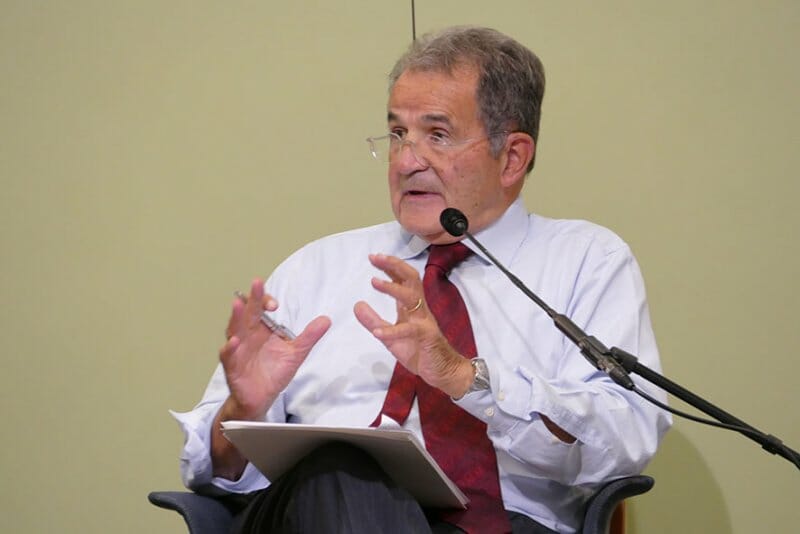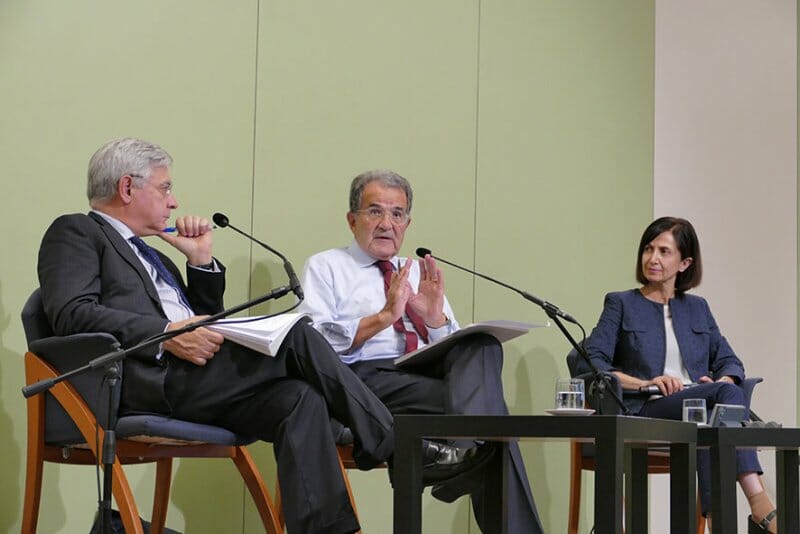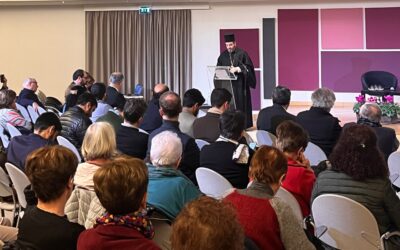 “We can react to this situation through forms of reorganization, even if they are not perfect, but which bring together countries and people from various fields. Our problem in Europe is one of an imperfect unity, but we must keep going with it. And in the context of the migrant crisis we feel that unity is essential to our future,” states Roman Prodi, twice Prime Minister of Italy and former President of the European Commission. As an economist, academic and politician, he gave an interview during the meeting for Focolare regional delegates. He continues, “We must build up reasons for hope in ways that will be different in different parts of the world. We need energy that comes from the base. Instead, in the Middle East we need the major world powers to dialogue with each other because otherwise nothing will be resolved.” The interview took place on 21 September, at the Mariapolis Centre in Castel Gandolfo, during the second week of the convention. The session was entitled: The world is tending towards unity: a socio-political viewpoint. While the subject matter is complex, it’s very much in tune with, and integrated into, the theme of unity which is the focus this year for the Focolare Movement and which has been dealt with throughout the program.
“We can react to this situation through forms of reorganization, even if they are not perfect, but which bring together countries and people from various fields. Our problem in Europe is one of an imperfect unity, but we must keep going with it. And in the context of the migrant crisis we feel that unity is essential to our future,” states Roman Prodi, twice Prime Minister of Italy and former President of the European Commission. As an economist, academic and politician, he gave an interview during the meeting for Focolare regional delegates. He continues, “We must build up reasons for hope in ways that will be different in different parts of the world. We need energy that comes from the base. Instead, in the Middle East we need the major world powers to dialogue with each other because otherwise nothing will be resolved.” The interview took place on 21 September, at the Mariapolis Centre in Castel Gandolfo, during the second week of the convention. The session was entitled: The world is tending towards unity: a socio-political viewpoint. While the subject matter is complex, it’s very much in tune with, and integrated into, the theme of unity which is the focus this year for the Focolare Movement and which has been dealt with throughout the program.  Together with Romano Prodi at the interview was session was Pasquale Ferrara, a diplomat, Secretary-General of the European University Institute in Florence, who is involved in academic activities and research in the field of international relations. He commented, “One point we should reflect on is that globalization has positive effects. The problem about globalisation is that it is not universal. Globalisation is about seeking to extend one economic model, liberal economics, to the whole world. On the political level it is the effort to spread liberal democracy.” He went on to invite everyone to “listen to the needs of all peoples in the world” because “peoples can’t be categorised into Series A and Series B. There can’t be members of the Security Council and then all the rest. We must take account of all the needs expressed by all peoples.” The solution he proposed: “To start from the foundations, building up civil and international society. We have too much trust in institutions, governments, organizations and authorities, which are of course important. But in many situations, especially in societies that are internally divided in their own countries, and which need to work through processes of reconciliation for example, it is vital that this work starts from interpersonal and inter-community relations. Those who do this should know that they are actually doing actually political, civil, social and institutional reconstruction.” The dialogue session, held in the presence of audience composed of representatives from the whole world, was stimulating. Each of those present had their own expectations, challenges and inner resources. The two political experts were able to give documented insights into the current global socio-political situation, which is both complex and ever-changing. It was a contribution which enriched the reflection deeply felt by those who embrace the ideals of the Focolare Movement and who wish to work towards universal brotherhood and the building peace.
Together with Romano Prodi at the interview was session was Pasquale Ferrara, a diplomat, Secretary-General of the European University Institute in Florence, who is involved in academic activities and research in the field of international relations. He commented, “One point we should reflect on is that globalization has positive effects. The problem about globalisation is that it is not universal. Globalisation is about seeking to extend one economic model, liberal economics, to the whole world. On the political level it is the effort to spread liberal democracy.” He went on to invite everyone to “listen to the needs of all peoples in the world” because “peoples can’t be categorised into Series A and Series B. There can’t be members of the Security Council and then all the rest. We must take account of all the needs expressed by all peoples.” The solution he proposed: “To start from the foundations, building up civil and international society. We have too much trust in institutions, governments, organizations and authorities, which are of course important. But in many situations, especially in societies that are internally divided in their own countries, and which need to work through processes of reconciliation for example, it is vital that this work starts from interpersonal and inter-community relations. Those who do this should know that they are actually doing actually political, civil, social and institutional reconstruction.” The dialogue session, held in the presence of audience composed of representatives from the whole world, was stimulating. Each of those present had their own expectations, challenges and inner resources. The two political experts were able to give documented insights into the current global socio-political situation, which is both complex and ever-changing. It was a contribution which enriched the reflection deeply felt by those who embrace the ideals of the Focolare Movement and who wish to work towards universal brotherhood and the building peace.
Video in Italian – transcript in English https://vimeo.com/140062041




0 Comments